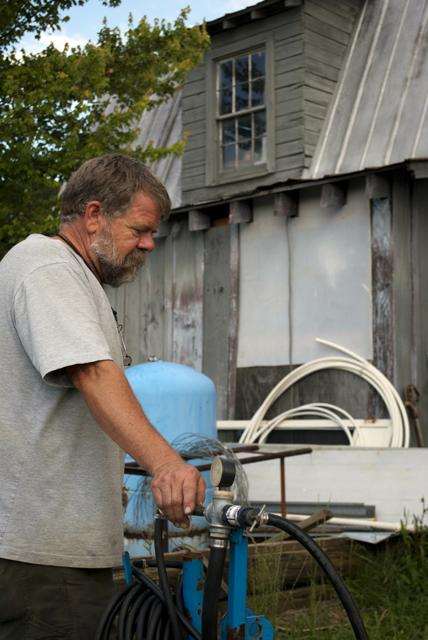- Salt of the earth: “We either love what we are doing or we are nuts!” says Zeb Jolley. Photo by Emma Scudder
- Farm hand: Holding teeny tiny potatoes on Jolley Farm Photo by Ian MacLellan
- Pest control: Zeb Jolley works closely with a friend. Photo by Ian MacLellan
“We either love what we are doing or we are nuts,” says Zeb Jolley, who owns and operates Jolley Farms, an Appalachian Grown-Certified farm in Canton, with his wife, June. June farms on nights and weekends after her full-time job as greenhouse manager at the North Carolina Arboretum, a position she’s held for the past 16 years. During peak season, he works on the farm seven days a week for more than 16 hours a day. And, among other crops, they grow 20 varieties of high-maintenance microgreens, delivering to numerous Asheville-area restaurants weekly.
Challenging Crops
Why take on such a challenge? “We just celebrated our 31st wedding anniversary,” Zeb says. “Almost all of those years have been spent growing something and working in greenhouses. Combined, that’s close to 62 years of greenhouse experience.” In other words, persnickety microgreens are no match for them.
Zeb and June began by growing delicate seedlings for bedding plants in greenhouses, before moving into all-vegetable production in 2008. That came after several years of taking a break from farmlife, working other full-time jobs. “With the great work that ASAP is doing to promote local farm products, I saw an opportunity to keep using my skill of growing,” says Zeb. “I went back to the farm.”
Like the seedlings they started with, microgreens require a great deal of attention. “Keeping tens of thousands of tiny little microgreen seedlings healthy enough to eat is a challenge, to say the least,” says Zeb. “But, they’re a perfect fit for our expertise and are a good crop for us.”
The couple decided when they made the shift to growing vegetables that they didn’t want to sell at tailgate markets or have an on-farm stand. Rather, they wanted to provide area restaurants and diners with the freshest produce possible. “We knew we needed upscale restaurants to market our microgreens to, because of the expense in growing them, so we knew we had to grow other specialty items, as well as some basics, to round out our offering,” Zeb says.
Today, they also grow a wide variety of baby vegetables in high tunnel-type greenhouses, including baby beets, fennel, carrots and squash, as well as edible flowers, sorrel, chard, kales, lettuces and pea shoots. Out in their field, they grow fingerling potatoes, heirloom tomatoes and winter squash. And they grow them all as sustainably as possible using integrated pest management practices. IMP is an environmentally sensitive approach aimed at creating the least possible hazard to people, property and the environment.
A Farming Family
The natural approach resonates with the Jolleys. They want to protect their land, where June grew up helping her mother tend to their vegetable garden, chickens, pigs and milk cows. Zeb also grew up farming. In fact, he was born into it.
“According to geological records, there were Jolley families farming Virginia in 1635,” he says. “In 1786, there are records of Jolleys owning and farming land in Durham County and my great, great, great, great grandfather owned and farmed land on the Broad River near Boiling Springs.”
More recently, Zeb’s grandfather farmed more than 300 acres in Chesnee, S.C., as B.B. Jolley Peach Farms. Zeb’s father helped managed the peach farm and Zeb spent his childhood summers there helping out with his cousins, the 14 other grandchildren.
“I think farming, or growing plants of some kind, is in my and June’s blood,” he says. That means that even though Zeb admits a day off would be nice, he and June have no plans to stop growing again.
“We hope to finesse our microgreen production even more, and would like to upgrade the production system for them,” he says, adding that he’s already begun talking with some of his restaurant clients about collecting their waste cooking oil to heat a real greenhouse. “Mainly, we plan to keep growing something good to eat and good for the soul and offering it to those who appreciate the same.”
Good Eats
You can find Jolley Farms’ products in dishes at many area Appalachian Grown-partner restaurants now, including Cúrate, Restaurant Solace, Table, Grove Park Inn’s Sunset Terrace and Blue Ridge Dining Room, Red Stag Grill, Sunburst Market on Montgomery and more.
Just what’s on the menu? “Our baby squash blossoms are coming in, along with fennel and beets, and we’re also customizing some of our microgreens into signature blends, such as Wasabi Mix and Jolley Farms Mix,” says Zeb, adding, “It won’t be long until cherry tomatoes are ripe!”
To learn more about Jolley Farms, visit http://www.jolleyfarms.com. To learn more about ASAP’s Appalachian Grown program, visit http://www.asapconnections.org. Find more AG farms and restaurant partners with ASAP’s Local Food Guide, online at http://www.appalachiangrown.org.
— Maggie Cramer is ASAPs communications manager; she can be reached at maggie@asapconnections.org







Before you comment
The comments section is here to provide a platform for civil dialogue on the issues we face together as a local community. Xpress is committed to offering this platform for all voices, but when the tone of the discussion gets nasty or strays off topic, we believe many people choose not to participate. Xpress editors are determined to moderate comments to ensure a constructive interchange is maintained. All comments judged not to be in keeping with the spirit of civil discourse will be removed and repeat violators will be banned. See here for our terms of service. Thank you for being part of this effort to promote respectful discussion.